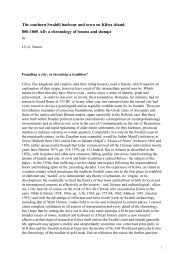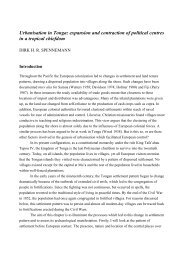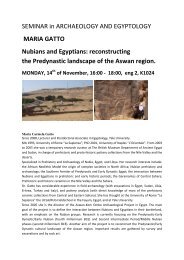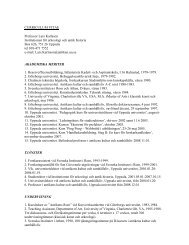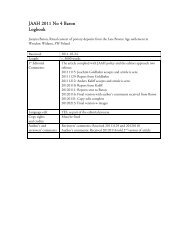Beowulf - Institutionen för arkeologi och antik historia
Beowulf - Institutionen för arkeologi och antik historia
Beowulf - Institutionen för arkeologi och antik historia
Create successful ePaper yourself
Turn your PDF publications into a flip-book with our unique Google optimized e-Paper software.
was probably the real reason why he originally left for Gaul (Reydellet 1994, p. X &<br />
XIII) . His first year in France resembles an educational tour and his poems to royalty,<br />
nobility and bishops were intended to establish him in Merovingian society. Some<br />
time after 573 AD Gregory of Tours became Venantius’ principal patron. Gregory<br />
commissioned poems from him, gave him a small villa, situated between Tours and<br />
Poitiers, and around 575 AD he encouraged Venantius to collect and publish his<br />
poems.<br />
While the modern reader will find unmistakable signs of an empty conventionality<br />
in Venantius’ verse, it is likely that the Merovingian aristocracy found it both pleasing<br />
and convincing, whether it occurred in official performances or in private letters. It<br />
should, however, be remembered that Sigibert’s court, and for that matter any<br />
Merovingian court, seems to have been prepared to use any means available to<br />
promote itself.<br />
Although Venantius’ early poetry contains attractive elements, most modern readers<br />
will eventually find him no more than an occasional poet of some technical skill—<br />
well versed in many arts. His original skill may nonetheless have been another,<br />
namely that of cunningly mixing classical epithalamium, panegyric and eulogy with a<br />
genuine understanding of Germanic ideology. Venantius’ talent in this respect may<br />
easily be overlooked even though we are aware of this general fact.<br />
From the classical point of view Venantius should be criticised for his extrovert,<br />
animated passion and his use of the concept of love may also rouse one or two critics<br />
(e.g., Dill 1926, pp. 333 f.). His style poses a problem since we may mistake it for<br />
empty manners and inconsistency. His attitudes, e.g., to the concept of love, are<br />
characterised by indecision, and they could in the end reflect a way of coping with<br />
nakedness and shame in Duerr’s sense, or the reverse, a primitive relationship to<br />
sexuality that would fit Norbert Elias’ thesis. In the epithalamium to be discussed<br />
below, he is most reluctant to comment on the erotic reality of marriage and that may<br />
remind us of Germanic prudery (cf. Duerr 1994, pp. 161 ff.). However, in the panegyrics,<br />
e.g., to Duke Gogo, he expresses his love for the Duke in exaggerated<br />
words that offended Dill as ‘tasteless love’ (1926, pp. 237 f.) and remind us of Elias’<br />
view upon ’childish’, ‘immature’ or ‘uncivilised’ relationships (cf. Elias, 1989, pp. 75<br />
f.). We meet the same kind of exaggeration in the poems to Duke Lupus:<br />
31 Sic ego, curarum valido defessus ab æstu,<br />
Noscens te salvum fonte refectus agor.<br />
O nomen mihi dulce Lupi replicabile semper,<br />
Quodque mei scriptum pagina cordis habet<br />
Quem semel inclusum tabulis dulcedinis intus<br />
Non abolenda virum pectoris arca tenet;<br />
93



